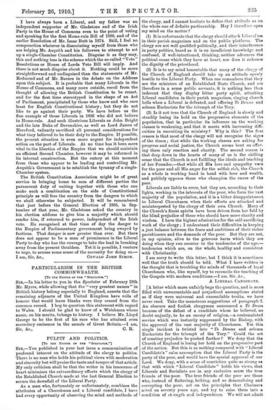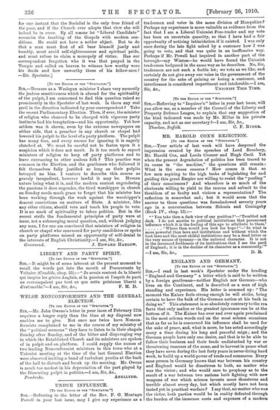PULPIT AND POLITICS.
[To THE EDITOR OF THE "SPECTATOR.]
SIR,—You published in your last issue a communication of profound interest on the attitude of the clergy to politics. There is no man who holds his political views with moderation and sincerity but will praise the taste and temper of that article. My only criticism shall be that the writer in his innocence of heart minimises the extraordinary efforts which the clergy of the Established Church made at the last General Election to secure the downfall of the Liberal Party.
As a man who, fortunately or unfortunately, combines the attributes of a Churchman and a Liberal candidate, I have had every opportunity of observing the mind and methods of the clergy, and I cannot hesitate to define that attitude as on the whole one of definite partisanship. May I therefore open my mind on the matter ?
(1) It is unfortunate that the clergy should attack Liberal"sm in their parish magazines and on the public platform. The clergy are not well qualified politically, and their interference in party politics, based as it is on insufficient knowledge and confused, if well-intentioned, thinking, neither advances the political cause which they have at heart, nor does it enhance the dignity of the priesthood.
(2) It is to my mind lamentable that many of the clergy of the Church of England should take up an attitude openly hostile to the Liberal Party. When one remembers that they are the ministers of an Established State Church, and are therefore in a sense public servants, it is nothing less than indecent that they display bitter party spirit, attacking Liberal candidates in their parish magazines, ringing church bells when a Liberal is defeated, and offering Te Deums and solemn Eucharists for the triumph of the Tory.
(3) Is it not true that the Church of England is slowly and steadily losing its hold on the progressive elements of the population, that in particular its influence on the working classes is weakening, and that it meets with increasing diffi- culties in recruiting its ministry ? Why is this ? The first reason is that most of the clergy will not recognise the signs of the times ; that while the working classes are asking for progress and social justice, the Church seems bent on offer- ing them only reaction and charity. The second reason is that deep down in the hearts of many of us is the chilling sense that the Church is not fulfilling the ideals and teaching of her Founder,—that while all His love and sympathy were for the poor and all His anger for the selfish rich, the Church as a whole is working hand in hand with beer and wealth, and publicly opposes those who champion the cause of the poor.
Liberals are liable to error, but they are, according to their lights, working in the interests of the poor, who form the vast majority of the population, and it is a bitter disappointment to Liberal Churchmen when their efforts are attacked and misinterpreted by the clergy of their own Church. Many of the Church's finest spirits have been driven from her fold by the blind prejudice of those who should have more charity and wisdom. I have the highest admiration for the self-sacrificing work of the clergy ; I understand their difficulties in keeping a just balance between the fears and ambitions of their richer parishioners and the demands of the poor. But they are not, in my opinion, alive to the grievous harm which they are doing when they run counter to the tendencies of the age; tendencies which are, on the whole, healthy and consistent with Christianity.
I am sorry to write this letter, but I think it is sometimes well that the truth should be told. What I have written is the thought that is troubling the minds of thousands of loyal Churchmen who, like myself, try to reconcile the teaching of the Gospels with modern conditions.—I am. Sir, &c., A LIBERAL CANDIDATE.
[A. letter which more unfairly begs the question, and is more filled with unwarrantable and prejudiced assumptions stated as if they were universal and unassailable truths, we have never read. Take the monstrous suggestions of paragraph 2. An obscure and foolish clergyman announced a Te Deum because of the defeat of a candidate whom he believed, no doubt unjustly, to be an enemy of religion,—a contemplated service which was instantly suppressed by the Bishop, with the approval of the vast majority of Churchmen. Yet this single incident is twisted into "Te Deums and solemn Eucharist& for the triumph of the Tory." Could the art of creating prejudice be pushed further ? We deny that the Church of England is losing her hold on the progressive part of the nation. But this is as nothing compared with "Liberal Candidate's" calm assumption that the Liberal Party is the party of the poor, and would have the special approval of our Lord. We deny, with a sense of conviction quite as strong as that with which "Liberal Candidate" holds his views, that Liberals and Socialists are in any exclusive senile the true friends of the poor. The true friends of the poor are those who, instead of flattering, bribing, and so demoralising and corrupting the poor, act on the principles that Chalmers alted on seventy years ago, and try to raise them into a condition of Et..ength and independence. We will not admit for one instant that the Socialist is the only true friend of the poor, and if the Church ever adopts that view she will indeed be in error. By all means let "Liberal Candidate" reconcile the teaching of the Gospels with modern con- ditions. He could not have a nobler object. But to do that a man must first of all bear himself justly and humbly, must avoid self-righteousness and spiritual pride, and must refuse to claim a monopoly of virtue. Has our correspondent forgotten who it was that prayed in the Temple and called on heaven to witness how worthy were his deeds and how unworthy those of his fellow-men ? —En. Spectator.]











































 Previous page
Previous page